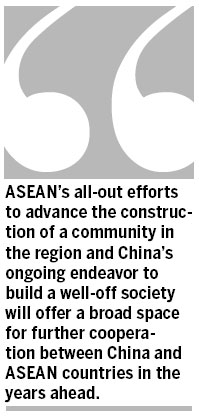
China's participation in political and strategic partnership with its neighbors has laid foundation for more cooperation
This year marks the 20th anniversary of the establishment of the dialogue mechanism between China and the Association of Southeast Asian Nations (ASEAN).
Over the past two decades, the advancement of all-round cooperation between two sides on the basis of mutual respect and equality has not only greatly boosted their economic and social development and brought enormous benefits to their peoples. It has also made important contributions to the peace, stability and prosperity of the whole region.
In 1991 a dialogue partnership was set up between China and ASEAN, and in 2003 China became the first outside power to enter the Treaty of Amity and Cooperation in Southeast Asia (TAC). A strategic partnership was established the same year oriented towards peace and prosperity and in 2010, the two sides set up a free trade area and signed the protocol on developing Southeast Asia into a nuclear-free region.
China and ASEAN have also achieved remarkable progress in the economic realm over the past two decades. In 1991, the bilateral trade volume was only $7.96 billion, but it soared to $292.78 billion in 2010. In the first half of this year, the trade value has already reached $171.12 billion, an increase of 25 percent year-on-year. Currently, China is the largest trading partner of ASEAN and ASEAN has replaced Japan to become China's third largest trading partner. The investment volumes between China and ASEAN countries have also considerably increased. By the end of June, the accumulated investment between China and ASEAN totaled nearly $80 billion. ASEAN has now become an important destination for China's enterprises seeking "outward" development.
Bilateral cooperation in infrastructure construction has also been booming in recent years. In 2009, China declared its plan to offer ASEAN $15 billion in credit and set up a $10 billion fund for investment cooperation with ASEAN members. So far, China has offered ASEAN countries $12.2 billion in credit for the construction of bridges, roads, power stations and other projects. There is also pragmatic cooperation between the two sides in marine transport, finance, construction and tourism.
Bilateral pragmatic cooperation between China and ASEAN has benefited from their win-win foreign policies. The rapid development of China and ASEAN countries in recent years has strengthened the awareness among regional members of the rejuvenation of East Asia and even the rise of Asia. As a result, cooperation has gained ground as the mainstream trend among East and Southeast Asian nations. The ASEAN model, East Asian regionalism and the willingness to resolve disputes through dialogue, as well as China's new security concept and its good-neighborly and friendly foreign polices all demonstrate the desire of China and the ASEAN members to seek greater cooperation and win-win results.
As a power with growing regional and international clout, China has increasingly integrated itself into ASEAN-advocated or ASEAN-led multilateral cooperative mechanisms. China's responsible behavior during the 1997 Asian financial crisis, its efforts toward the establishing of a Sino-ASEAN free trade area as well as its participation in political, security and strategic cooperation with ASEAN, as indicated by its entry into TAC and the establishment of a strategic partnership with ASEAN, have laid down a policy framework for bilateral systematic cooperation.
It is China's consistent stance that all countries, big or small, are equal and it has sought dialogue when disputes have arisen. Such a responsible attitude has helped China and ASEAN lay down a solid foundation for win-win cooperation.
China's rapid development has offered regional countries not only opportunities, but also, in their eyes, challenges. This has been particularly obvious since last year when China and ASEAN witnessed an increased bilateral trade volume following the launch of a free trade area and the increased disputes in the South China Sea. The increased risk of US involvement in the South China Sea issue has added to the complexity of regional situations. In the process of their deepened cooperation both sides have also encountered some new challenges in non-traditional security issues, from water resources to natural disasters.
ASEAN's all-out efforts to advance the construction of a community in the region and China's ongoing endeavor to build a well-off society will offer a broad space for Sino-ASEAN cooperation in the years ahead.
China is willing to work together with ASEAN members under good-neighborly, mutually beneficial and win-win principles in a bid to advance the bilateral strategic partnership and make greater contributions to East and Southeast Asian peace, stability and prosperity.
The author is a researcher with the Institute of South and Southeast Asian Studies under the China Institutes of Contemporary International Relations
(China Daily 08/22/2011 page8)